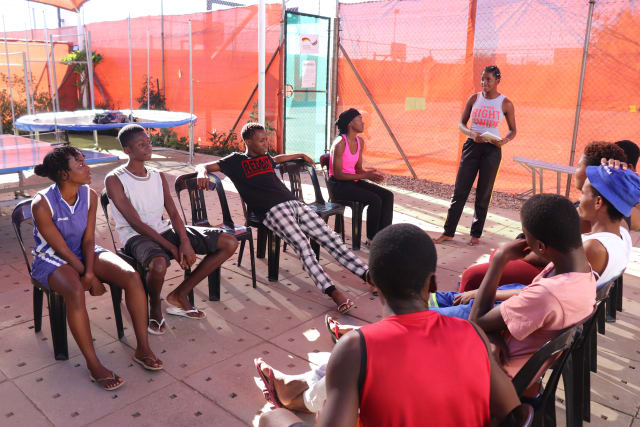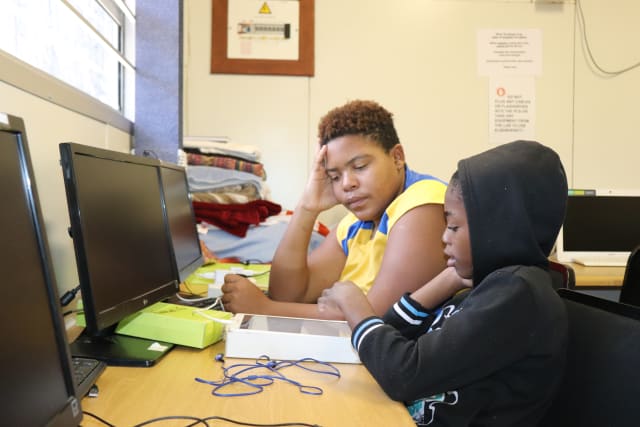BAS, a safe haven for underprivileged youths during the pandemic
WINDHOEK (Namibia) - The Basketball Artists School (BAS) in Katutura is providing a safe haven for underprivileged youths during the confinement due to the pandemic
WINDHOEK (Namibia) - The Basketball Artists School (BAS) in Katutura, a Township of Windhoek Namibia provides a safe place for less-privileged youths to go to after school and get support in their studies along with basketball training, showing a perfect example of using Basketball For Good. The IBF has been supporting BAS for the past 3 years. During this time of pandemic, the school has had to close but after seeing an urgent need to help some of the BAS beneficiaries, they developed an emergency program.
BAS Executive Director and Namibia Basketball Federation Secretary General Ramah Mumba explains the situation:
The current situation in Namibia is very different because of COVID-19. Everything has come to a standstill. We are a country that is always on the move so having a lockdown is something very strenuous to us. Movements have been minimised for safety reasons which is good but also has bad consequences.
“BAS is a safe haven for all of them. Helping the BAS beneficiaries is second nature for us, we believe in family values and we are a big family and we are there for them when they need us.”
In our informal settlements in Katutura, there are families who don’t have the best possible homes so lock down becomes difficult. We have many workers who perform blue collar work which requires a daily hustle and the lockdown disallows this. Families in Katutura live a survival lifestyle so they make ends meet as the days come and having no business for even one day, can take a toll on families.
The frustration of having especially large families all in one home and being incapable of putting food on the table, can cause violence to breakout in these homes due to scarcity of resources. Robberies also increase.
The lock down is supposed to end May 4th, but it might be extended. Namibia’s economy was not good before the pandemic, it might get worse after.
Since there is a lock down and all schools are closed, BAS had to officially close as well. We are all required to stay home and minimize movement.
A few of our BAS beneficiaries started reaching out to us for some basic needs that we could help them with. Later, when we asked for further details, we also saw that the lock down was affecting the families as most of their parents lost jobs or are not getting an income at the moment. A household in Katutura can have on average 5 to 10 people living in a very small house or shack and some are experiencing a shortage of food.

Thus, BAS has decided to launch an emergency program to assist struggling BAS beneficiaries. They are housed on the premises to avoid movement from home to BAS. We now have 15 who are in need of this program. We are providing meals and helping with some small needs such as toiletries.
“I feel much safer being here than being outside or at home. The program means acceptance to me, here I am treated like a very important part of the family and I feel needed and important”
The program consists of daily routine schedules for all the beneficiaries, they follow a set of activities. They do gym workouts; they have breakfast which they themselves prepare and then work starts. Many are working digitally and online. Mentorship programs begin after breakfast where some of the alumni teach the younger ones.
Some participants are school students, so we prepare them mentally for when lock down is over, so they are prepared to jump right back into academic studies.
Life skills is never overlooked at BAS and this program is no exception. We have life skills sessions where we sit and share opinions on issues that the children have gone through or are still working through and what goes on in their communities. This platform is a great way to remind the children that just because the world is on lockdown, other problems are still ongoing, and we need to focus on solving them as much we are focused on solving this pandemic.

The participants have playing time and the day is ended with another meeting which is a roundup of the day. Dinner is again prepared by the participants themselves after which there is an evening reading session. The participants end the day the way they started it, together.
The activities of the emergency program are all done to keep the team spirit alive and to work together. Having the participants do things according to a schedule and giving them a daily responsibility teaches them values such as commitment and reliability.
BAS is a safe haven for all of them. Helping the BAS beneficiaries is second nature for us, we believe in family values and we are a big family and we are there for them when they need us.
4 of the beneficiaries express their gratitude towards the program and basketball:
Timo, 16 years old: “I feel much safer being here than being outside or at home. The program means acceptance to me, here I am treated like a very important part of the family and I feel needed and important. It also helps me with my education. Basketball taught me passion; it gave me something to love”
Titus, 15 years old: “I feel like I am in a safe place around everyone from BAS. The program means family to me and teaches me how to love and care for other people. Basketball has given me a lot of opportunities to play with new people and to represent my country.”
Hilen, 18 years old: “Being at BAS I feel safe. The situation outside is not as safe as the environment at BAS. The program means a lot because it teaches me about values and about life. Basketball has taught me how to handle my ups and downs and taught me responsibility and how to treat others the same way I wish to be treated."
Mbasuva, 11 years old: "Being in this program is fun for me because being at home is always boring. I feel happy being at the program because we have a lot of things to do, it means learning and working hard. Basketball taught me new things like how to use both my hands first I only knew how to use my right hand but now I know how to use both".